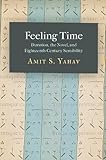Feeling Time : Duration, the Novel, and Eighteenth-Century Sensibility / Amit S. Yahav.
Material type: TextPublisher: Philadelphia : University of Pennsylvania Press, [2018]Copyright date: ©2018Description: 1 online resource (208 p.) : 1 illusContent type:
TextPublisher: Philadelphia : University of Pennsylvania Press, [2018]Copyright date: ©2018Description: 1 online resource (208 p.) : 1 illusContent type: - 9780812295030
- 823/.509384 23
- online - DeGruyter
| Item type | Current library | Call number | URL | Status | Notes | Barcode | |
|---|---|---|---|---|---|---|---|
 eBook
eBook
|
Biblioteca "Angelicum" Pont. Univ. S.Tommaso d'Aquino Nuvola online | online - DeGruyter (Browse shelf(Opens below)) | Online access | Not for loan (Accesso limitato) | Accesso per gli utenti autorizzati / Access for authorized users | (dgr)9780812295030 |
Browsing Biblioteca "Angelicum" Pont. Univ. S.Tommaso d'Aquino shelves, Shelving location: Nuvola online Close shelf browser (Hides shelf browser)

|

|

|

|

|

|

|
||
| online - DeGruyter "Sefer Hasidim" and the Ashkenazic Book in Medieval Europe / | online - DeGruyter Dante's Philosophical Life : Politics and Human Wisdom in "Purgatorio" / | online - DeGruyter Why Terrorist Groups Form International Alliances / | online - DeGruyter Feeling Time : Duration, the Novel, and Eighteenth-Century Sensibility / | online - DeGruyter Military Cultures in Peace and Stability Operations : Afghanistan and Lebanon / | online - DeGruyter Strange Bedfellows : Marriage in the Age of Women's Liberation / | online - DeGruyter Governing Bodies : American Politics and the Shaping of the Modern Physique / |
Frontmatter -- Contents -- Introduction. The Sensibility Chronotope -- Chapter 1. Composing Human Time: Locke, Hume, Addison, and Diderot -- Chapter 2. Temporal Moralities and Momentums of Plot: Richardson and Hutcheson -- Chapter 3. Sympathetic Moments and Rhythmic Narration: Sterne, Early Musicology, and the Elocutionists -- Chapter 4. Durational Aesthetics and the Logic of Character: Radcliffe, Burke, and Smith -- Coda. The End of Human Time? -- Notes -- Bibliography -- Index -- Acknowledgments
restricted access online access with authorization star
http://purl.org/coar/access_right/c_16ec
Literary historians have tended to associate the eighteenth century with the rise of the tyranny of the clock—the notion of time as ruled by mechanical chronometry. The transition to standardized scheduling and time-discipline, the often-told story goes, inevitably results in modernity's time-keeper societies and the characterization of modern experience as qualitatively diminished.In Feeling Time, Amit Yahav challenges this narrative of the triumph of chronometry and the consequent impoverishment of individual experience. She explores the fascination eighteenth-century writers had with the mental and affective processes through which human beings come not only to know that time has passed but also to feel the durations they inhabit. Yahav begins by elucidating discussions by Locke and Hume that examine how humans come to know time, noting how these philosophers often consider not only knowledge but also experience. She then turns to novels by Richardson, Sterne, and Radcliffe, attending to the material dimensions of literary language to show how novelists shape the temporal experience of readers through their formal choices. Along the way, she considers a wide range of eighteenth-century aesthetic and moral treatises, finding that these identify the subjective experience of duration as the crux of pleasure and judgment, described more as patterned durational activity than as static state.Feeling Time highlights the temporal underpinnings of the eighteenth century's culture of sensibility, arguing that novelists have often drawn on the logic of musical composition to make their writing an especially effective tool for exploring time and for shaping durational experience.
Mode of access: Internet via World Wide Web.
In English.
Description based on online resource; title from PDF title page (publisher's Web site, viewed 25. Jun 2024)


